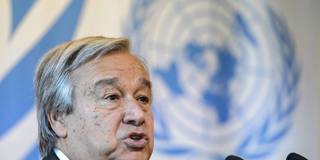At a time when global cooperation is being undermined by conflicts of interest among traditional and rising powers, the question of who leads the international institutions is more important than ever. The traditional approach to selecting them – guided by national rivalries and popularity contests – is no longer good enough.
OXFORD – The United Nations is seeking a new secretary-general. The World Bank presidency is up for grabs. The World Health Organization needs a new head. The same goes for several other international organizations. At a time when conflicts of interest among the United States and its allies, together with the rise of China and Russia, are undermining global cooperation, the question of who fills these vacancies could not be more important.

OXFORD – The United Nations is seeking a new secretary-general. The World Bank presidency is up for grabs. The World Health Organization needs a new head. The same goes for several other international organizations. At a time when conflicts of interest among the United States and its allies, together with the rise of China and Russia, are undermining global cooperation, the question of who fills these vacancies could not be more important.